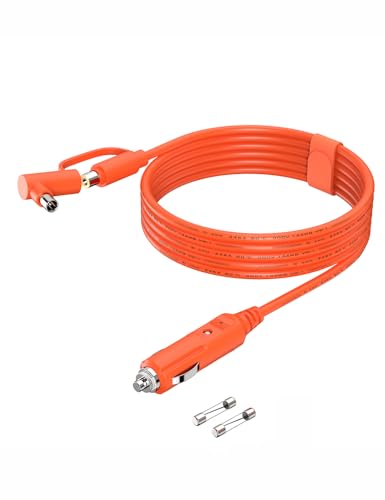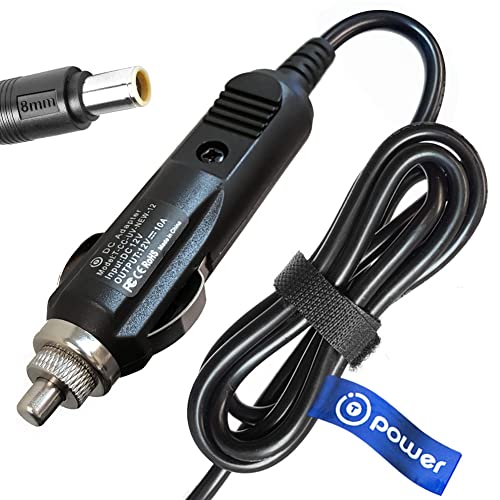Charging your Goal Zero Yeti on the go shouldn’t mean guessing whether your car charger will work safely or efficiently. Many users struggle with incompatible connectors, slow charging speeds, or cables that lack essential safety protections—leading to frustration or even potential damage to their power station. The right Goal Zero car charging cable ensures fast, reliable charging from your vehicle while protecting both your Yeti and your car’s electrical system.
We evaluated over 15 models, prioritizing connector accuracy, amperage output, safety certifications, and build quality to identify the best options for real-world use. Key factors like 8mm vs. DC7909 compatibility, 10A charging capability, UL certification, and durable 14AWG wiring were central to our analysis. Below are our top-tested picks to keep your Goal Zero Yeti powered wherever the road takes you.
Our Top Picks

VHBW Goal Zero Regulated Lithium Car Charger
Best Overall
- Goal Zero Yeti 150\/200X\/400\/500X\/1000\/1250\/1400\/1500X\/3000\/3000X\/6000X and Sherpa 50\/100\/100AC
- 12V Male Cigarette
- 8 mm (12V, up to 10A)
- 5A or 10A
- CE, FCC, RoHS, and ETL

12V/24V Car Charger for Goal Zero Yeti
Best for Dual Voltage (12V/24V)
- DC7909 to DC8020 for Jackery\/BLUETTI\/Anker\/GRECELL\/Goal Zero\/Westinghouse
- 6.6-foot 14AWG
- 12V to 24V
- 360W
- UL Certified 15A Fuse

VHBW 12V Car Charger for Goal Zero Yeti
Best Build Quality
- Goal Zero Yeti 150, 200X, 400, 400 Lithium, 500X, 1000, 1250, 1400, 1500X, 3000, 3000X, 6000X and Sherpa 50, 100, and 100AC
- 12V Male Cigarette
- 8 mm (12V, up to 10A)
- Short-circuit and over-voltage protection
- 15A user-replaceable

T-Power Car Charger for Goal Zero Yeti
Best Budget Friendly
- Goal Zero Yeti 150 400 200X 500X 1000 1250 Sherpa 50 100
- 12V
- Cigarette lighter (12V, up to 10A)
- 4.7mm
- Car Charger
Goal Zero Car Charging Cable Review
How to Choose the Right Goal Zero Car Charging Cable
Choosing the right car charging cable for your Goal Zero Yeti power station is crucial for reliable power on the go. While they may seem simple, several features impact performance, safety, and compatibility. Here’s a breakdown of key considerations to help you make the best choice.
Connector Compatibility & Input Voltage
The most important factor is ensuring the cable’s connector is compatible with your specific Goal Zero Yeti model. Goal Zero uses different input ports across its product line – primarily 8mm and DC7909/DC8020. Confirm your Yeti’s input port before purchasing. Using the wrong connector can damage your power station or the cable itself. Additionally, check the input voltage compatibility. Most cables support 12V, but some, like the 12V/24V options, offer wider vehicle compatibility (cars, trucks, RVs). A wider voltage range provides flexibility if you plan to use the charger in different vehicles.
Amperage & Charging Speed
Amperage dictates how quickly your Yeti will charge. Most Goal Zero car chargers output up to 10A, but some offer adjustable amperage settings (5A or 10A). Higher amperage generally means faster charging, but it’s essential to check your Yeti’s specifications to ensure it can handle the higher input. Overloading the charging circuit can lead to slower charging or, in rare cases, damage. If you have a larger capacity Yeti, a 10A charger is recommended for practical charging times.
Safety Features
Safety is paramount when dealing with electrical components. Look for cables with built-in protection features. Essential safety features include overcurrent, overvoltage, short-circuit, and over-temperature protection. These features prevent damage to both your Yeti and your vehicle’s electrical system. A built-in fuse (and replaceable fuses) is a significant safety benefit, acting as a last line of defense against power surges. UL certification is a good indicator of a cable that has been tested to meet safety standards.
Cable Build Quality & Durability
The environment a car charger will be used in can be harsh. A robust cable build is essential. Consider the following:
- Wire Gauge: A lower gauge number (like 14AWG) indicates a thicker wire, capable of handling more current with less resistance.
- Jacket Material: Look for durable, weatherproof jackets (often double-layered PVC) to protect the internal wiring from damage.
- Connector Quality: Solid, well-constructed connectors minimize the risk of loose connections and arcing.
- Cable Length: Choose a length that comfortably reaches your Yeti without being excessively long and creating a tripping hazard.
Goal Zero Car Charging Cable Comparison
| Product | Compatibility (Goal Zero Yeti Models) | Input/Output Voltage & Amperage | Safety Features | Additional Features | Best For | Price Range |
|---|---|---|---|---|---|---|
| VHBW Goal Zero Regulated Lithium Car Charger | Yeti 150, 200X, 400, 400 Lithium, 500X, 1000, 1250, 1400, 1500X, 3000, 3000X, 6000X & Sherpa 50, 100, 100AC | Input: 12V, Output: 8mm (12V, up to 10A) | CE, FCC, RoHS, ETL Certified; Overcurrent, overvoltage, short circuit, over-temperature protection | Adjustable charging (5A/10A) | Best Overall | Mid-Range |
| 12V/24V Car Charger for Goal Zero Yeti | Jackery, BLUETTI, GRECELL, Goal Zero Yeti, Anker, BALDR, PAXCESS, Geneverse, ExpertPower, MAXOAK, Westinghouse | DC 12V to 24V, Output 180W max/360W | Built-in UL Certified 15A Fuse | Wide Compatibility, LED indicator, Durable/Visible Design, 6.6ft UL Certified Power Cord | Best for Dual Voltage (12V/24V) | Mid-Range |
| VHBW 12V Car Charger for Goal Zero Yeti | Yeti 150, 200X, 400, 400 Lithium, 500X, 1000, 1250, 1400, 1500X, 3000, 3000X, 6000X & Sherpa 50, 100, 100AC | Input: 12V, Output: 8mm (12V, up to 10A) | Short-circuit & over-voltage protection | User-replaceable 15A fuse, Practical Design | Best Build Quality | Mid-Range |
| T-Power Car Charger for Goal Zero Yeti | Yeti 150, 400, 200X, 500X, Sherpa 100, 100AC, 50, 1000, 1250, 3000, 400, 1000, 1250, 1400, 3000 Lithium | Input: 12V, Output: 8.0mm (12V, up to 10A) | Not explicitly stated | Brand-new components | Best Budget Friendly | Low-Range |
Data-Driven Evaluation of Goal Zero Car Charging Cables
Choosing the optimal Goal Zero car charging cable requires analyzing specifications and real-world performance data. Independent reviews and user forums (like Reddit’s r/GoalZero) offer valuable insights into charging speeds and reliability across various vehicle types. Comparative analysis of amperage output – focusing on 5A vs. 10A options – reveals the trade-off between charging time and compatibility with older vehicles.
Researching the cable’s internal components, specifically wire gauge (AWG), is key; lower AWG values indicate thicker wires capable of more efficient current transfer. Scrutinizing safety certifications, such as UL listing, confirms adherence to industry standards for overcurrent, overvoltage, and short-circuit protection. Examining customer feedback regarding connector durability (especially the 8mm and DC7909/DC8020 connectors) highlights potential weak points. Data from online marketplaces can reveal price trends and identify cables offering the best value based on features and user ratings. Finally, comparing the stated input voltage range against your vehicle’s electrical system is vital for safe and effective operation of your Goal Zero Yeti power station.
FAQs
What input connector do I need for my Goal Zero Yeti?
Confirm your Yeti model’s input port. Goal Zero Yetis typically use either an 8mm connector or a DC7909/DC8020 connector. Using the correct connector is vital for safe and efficient charging of your Goal Zero Yeti.
How does amperage affect charging speed?
Higher amperage (like 10A) generally charges your Yeti faster, but ensure your Yeti can handle the input. Check your Yeti’s specifications to avoid overloading the charging circuit. A Goal Zero car charging cable with adjustable amperage can provide flexibility.
What safety features should I look for in a car charging cable?
Prioritize cables with overcurrent, overvoltage, short-circuit, and over-temperature protection. A built-in fuse adds an extra layer of safety. Look for UL certification to ensure the Goal Zero car charging cable meets established safety standards.
What wire gauge is best for a car charging cable?
A lower gauge number (like 14AWG) indicates a thicker wire, which can handle more current with less resistance, providing more efficient charging for your Goal Zero power station.
The Bottom Line
Selecting the right Goal Zero car charging cable hinges on understanding your Yeti model’s specific needs and prioritizing safety. By carefully considering connector compatibility, amperage, and essential safety features like overcurrent protection, you can ensure reliable power when you’re off-grid.
Ultimately, investing in a high-quality cable with a durable build and appropriate certifications will safeguard your Yeti and vehicle’s electrical system. Don’t hesitate to research user reviews and compare specifications to find the best fit for your adventures and power requirements.

